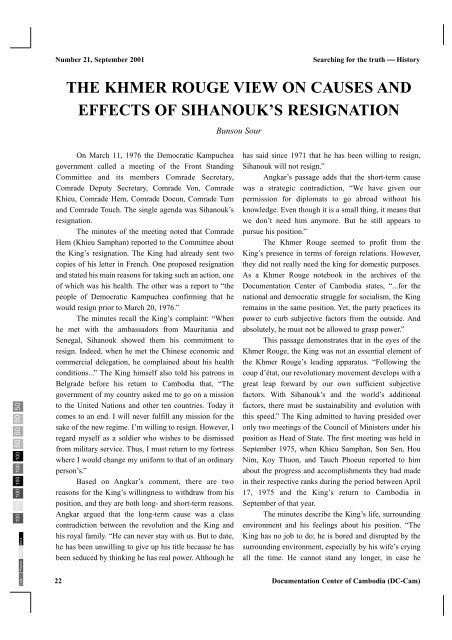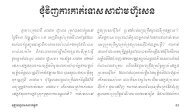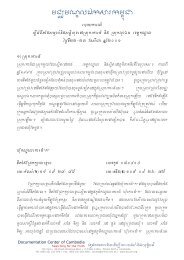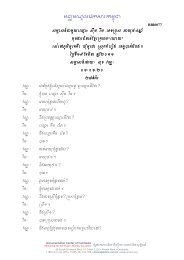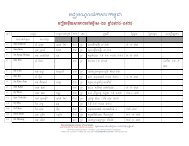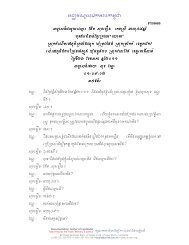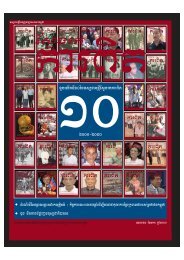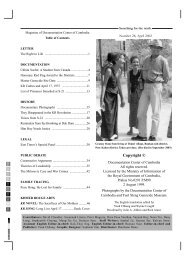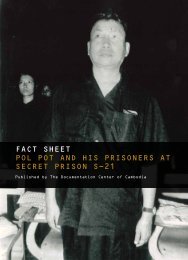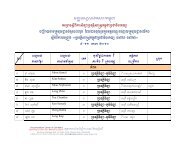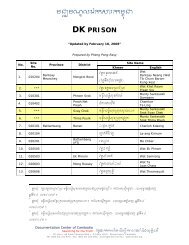Searching for the truth Issues 21 - Documentation Center of Cambodia
Searching for the truth Issues 21 - Documentation Center of Cambodia
Searching for the truth Issues 21 - Documentation Center of Cambodia
Create successful ePaper yourself
Turn your PDF publications into a flip-book with our unique Google optimized e-Paper software.
100 100 100 100 100 100 50 50 50 50<br />
Black<br />
Yellow<br />
Magenta<br />
Cyan<br />
Number <strong>21</strong>, September 2001<br />
On March 11, 1976 <strong>the</strong> Democratic Kampuchea<br />
government called a meeting <strong>of</strong> <strong>the</strong> Front Standing<br />
Committee and its members Comrade Secretary,<br />
Comrade Deputy Secretary, Comrade Von, Comrade<br />
Khieu, Comrade Hem, Comrade Doeun, Comrade Tum<br />
and Comrade Touch. The single agenda was Sihanouk’s<br />
resignation.<br />
The minutes <strong>of</strong> <strong>the</strong> meeting noted that Comrade<br />
Hem (Khieu Samphan) reported to <strong>the</strong> Committee about<br />
<strong>the</strong> King’s resignation. The King had already sent two<br />
copies <strong>of</strong> his letter in French. One proposed resignation<br />
and stated his main reasons <strong>for</strong> taking such an action, one<br />
<strong>of</strong> which was his health. The o<strong>the</strong>r was a report to “<strong>the</strong><br />
people <strong>of</strong> Democratic Kampuchea confirming that he<br />
would resign prior to March 20, 1976.”<br />
The minutes recall <strong>the</strong> King’s complaint: “When<br />
he met with <strong>the</strong> ambassadors from Mauritania and<br />
Senegal, Sihanouk showed <strong>the</strong>m his commitment to<br />
resign. Indeed, when he met <strong>the</strong> Chinese economic and<br />
commercial delegation, he complained about his health<br />
conditions...” The King himself also told his patrons in<br />
Belgrade be<strong>for</strong>e his return to <strong>Cambodia</strong> that, “The<br />
government <strong>of</strong> my country asked me to go on a mission<br />
to <strong>the</strong> United Nations and o<strong>the</strong>r ten countries. Today it<br />
comes to an end. I will never fulfill any mission <strong>for</strong> <strong>the</strong><br />
sake <strong>of</strong> <strong>the</strong> new regime. I’m willing to resign. However, I<br />
regard myself as a soldier who wishes to be dismissed<br />
from military service. Thus, I must return to my <strong>for</strong>tress<br />
where I would change my uni<strong>for</strong>m to that <strong>of</strong> an ordinary<br />
person’s.”<br />
Based on Angkar’s comment, <strong>the</strong>re are two<br />
reasons <strong>for</strong> <strong>the</strong> King’s willingness to withdraw from his<br />
position, and <strong>the</strong>y are both long- and short-term reasons.<br />
Angkar argued that <strong>the</strong> long-term cause was a class<br />
contradiction between <strong>the</strong> revolution and <strong>the</strong> King and<br />
his royal family. “He can never stay with us. But to date,<br />
he has been unwilling to give up his title because he has<br />
been seduced by thinking he has real power. Although he<br />
22<br />
<strong>Searching</strong> <strong>for</strong> <strong>the</strong> <strong>truth</strong> ⎯ History<br />
THE KHMER ROUGE VIEW ON CAUSES AND<br />
EFFECTS OF SIHANOUK’S RESIGNATION<br />
Bunsou Sour<br />
has said since 1971 that he has been willing to resign,<br />
Sihanouk will not resign.”<br />
Angkar’s passage adds that <strong>the</strong> short-term cause<br />
was a strategic contradiction, “We have given our<br />
permission <strong>for</strong> diplomats to go abroad without his<br />
knowledge. Even though it is a small thing, it means that<br />
we don’t need him anymore. But he still appears to<br />
pursue his position.”<br />
The Khmer Rouge seemed to pr<strong>of</strong>it from <strong>the</strong><br />
King’s presence in terms <strong>of</strong> <strong>for</strong>eign relations. However,<br />
<strong>the</strong>y did not really need <strong>the</strong> king <strong>for</strong> domestic purposes.<br />
As a Khmer Rouge notebook in <strong>the</strong> archives <strong>of</strong> <strong>the</strong><br />
<strong>Documentation</strong> <strong>Center</strong> <strong>of</strong> <strong>Cambodia</strong> states, “...<strong>for</strong> <strong>the</strong><br />
national and democratic struggle <strong>for</strong> socialism, <strong>the</strong> King<br />
remains in <strong>the</strong> same position. Yet, <strong>the</strong> party practices its<br />
power to curb subjective factors from <strong>the</strong> outside. And<br />
absolutely, he must not be allowed to grasp power.”<br />
This passage demonstrates that in <strong>the</strong> eyes <strong>of</strong> <strong>the</strong><br />
Khmer Rouge, <strong>the</strong> King was not an essential element <strong>of</strong><br />
<strong>the</strong> Khmer Rouge’s leading apparatus. “Following <strong>the</strong><br />
coup d’état, our revolutionary movement develops with a<br />
great leap <strong>for</strong>ward by our own sufficient subjective<br />
factors. With Sihanouk’s and <strong>the</strong> world’s additional<br />
factors, <strong>the</strong>re must be sustainability and evolution with<br />
this speed.” The King admitted to having presided over<br />
only two meetings <strong>of</strong> <strong>the</strong> Council <strong>of</strong> Ministers under his<br />
position as Head <strong>of</strong> State. The first meeting was held in<br />
September 1975, when Khieu Samphan, Son Sen, Hou<br />
Nim, Koy Thuon, and Tauch Phoeun reported to him<br />
about <strong>the</strong> progress and accomplishments <strong>the</strong>y had made<br />
in <strong>the</strong>ir respective ranks during <strong>the</strong> period between April<br />
17, 1975 and <strong>the</strong> King’s return to <strong>Cambodia</strong> in<br />
September <strong>of</strong> that year.<br />
The minutes describe <strong>the</strong> King’s life, surrounding<br />
environment and his feelings about his position. “The<br />
King has no job to do; he is bored and disrupted by <strong>the</strong><br />
surrounding environment, especially by his wife’s crying<br />
all <strong>the</strong> time. He cannot stand any longer, in case he<br />
<strong>Documentation</strong> <strong>Center</strong> <strong>of</strong> <strong>Cambodia</strong> (DC-Cam)


